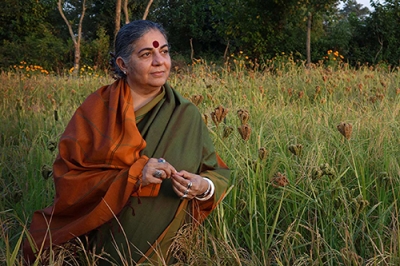
In a world beset by big agricultural bullies like Monsanto (now Bayer), there also exist grassroot environmentalists like Dr. Vandana Shiva, who seek to re-align the sacred relationship between man and earth, which has been broken in her own words, “by the violence in agriculture today”.
Dr Shiva is a food sovereignty and anti-globalisation advocate. She did her schooling from the Convent of Jesus and Mary, Dehradun and earned a master’s degree in the philosophy of science from the University of Guelph in 1977. She received her PhD in philosophy from the University of Western Ontario.
She has written extensively on bioethics, biodiversity and genetic engineering. She is often referred to as the ‘Gandhi of Grain’ due to her passionate resistance to Genetically Modified Organisms (GMOs) and her advocacy of reverting to practices that involve growing food in tandem with nature and not against it.
She was a vehement critic of Asia’s Green Revolution, which began in the 1960s, to increase food production through higher-yielding seed stocks and increased use of pesticides and fertilizers.
In 1991 Shiva launched Navdanya, meaning ‘Nine Seeds’. The project aimed to counter the monoculture promoted by large corporations by collecting, conserving and distributing indigenous seeds and promoting seed sovereignty in local farming communities. Navdanya has set up 150 community seed banks in India in the last 30 years, a truly unparalleled achievement.
Dr Shiva received the ‘Right Livelihood Award’ in 1993, established by Swedish-German philanthropist Jakob von Uexkull, which is regarded as an alternative Nobel Prize. She is a member of Fundacion IDEAS, Spain’s Socialist Party’s think tank.
Picture Credit : Google




